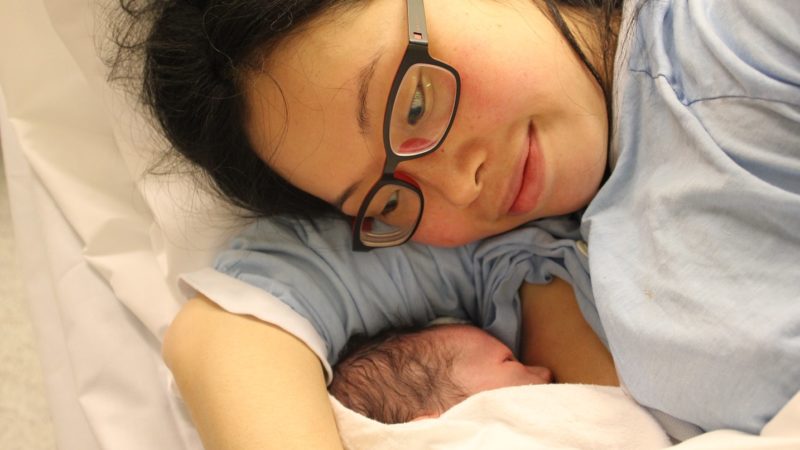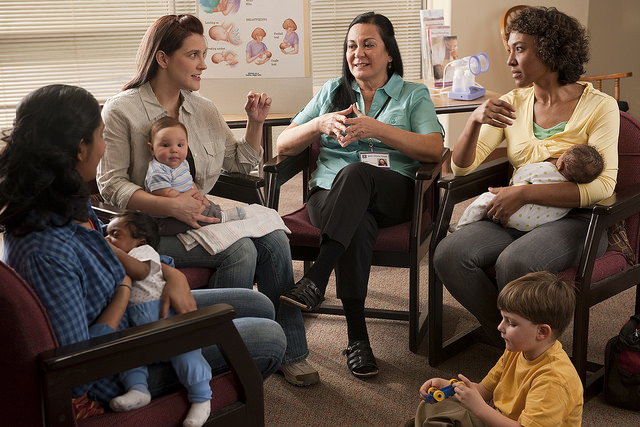
Uncomplicated Pregnancies – A Q&A with Dr Sophie Relph
Big Birthas Parenting Science Gang were delighted to chat to Dr Sophie Relph about her proposed research into uncomplicated pregnancies amongst larger mothers.
Image: Cristian Newman
Sophie: Good evening everyone!
I am a trainee obstetric doctor by background, but currently working as a junior researcher at the Department of Women’s Health in King’s College London.
I have two main research focusses:
1) Studying whether an intervention during pregnancy can improve detection of babies who are growth restricted before birth and,
2) Studying what characteristics make a woman with obesity more likely to have a pregnancy without complications and a birth without complications. This includes speaking to women who are obese and asking what influences the healthcare and lifestyle choices they make during pregnancy.
I understand that your group are planning some very similar research, so I hope that we can help each other tonight.
BASILISK: Thanks so much for joining us Sophie. I guess you have seen A LOT of pregnancies! What made you want to undertake this sort of research?
Sophie: Yes! Quite a lot – I’ve been looking after pregnant women for 7 years. There are many reasons for wanting to undertake this research.
Firstly, from my experience of looking after women, it was clear that many of them wanted greater choices regarding the place/type of birth they were offered. Secondly, it is becoming increasingly obvious from other people’s research that not all women with obesity are as ‘risky’ as we previously thought and thirdly, this affects a fifth of all pregnant women – and so there’s a huge number of women that it affects!
UNICORN: Yay! Your research is Soooo welcome!
PHOENIX: It really is!!
SPHINX: Hi Sophie, thanks for being here! 🙂
Sophie: It is my pleasure! I was so pleased to hear about your group and very interested to meet you all. We share a common interest.
Q: Anecdotally, it seems a lot of larger women’s pregnancies are still treated as “risky” by default. Are many larger women being denied choices unnecessarily, do you think?
Sophie: I think it might be too early to say that. Apparently, it usually takes about 17 years for any research to make its way into clinical practice!
I don’t expect this knowledge to take that long, but I do think we are not yet ready to offer entirely ‘low risk’ care to all larger ladies. And we don’t yet know how to identify which women are still going to have more complicated pregnancies, and which are going to have straightforward pregnancies without problems. That’s what my research is about.
SPHINX: Wow, 17 years is a very long time! My now-primary-aged daughter could be having babies by then (scary thought!!!)
I hope clinical practice changes much sooner than that!
BASILISK: (I didn’t need that thought thank you! Our kids…. having kids!)
Q: Was your experience with obese women in hospital that their choices were being needlessly reduced for no reasons other than BMI?
Sophie: My experience is certainly that choices are limited to obese women.
Sometimes, this is done because they genuinely are at risk of having complication in birth, such as higher risk of Caesarean section, bleeding after the baby is born and the baby’s shoulders getting stuck during birth.
I think what is often not acknowledged is that a lady who is obese and previously had an uncomplicated pregnancy and birth, is likely to do the same again.
UNICORN: Have you noticed a trend in bigger pregnant women being less inclined to allow this [their choices being reduced] to take place?
Sophie: I’ve actually noticed that women with all sorts of characteristics which make them more ‘risky’ in pregnancy, are more inclined to make choices outside of what is usually offered.
Women are increasingly feeling more empowered to weigh up the risks and benefits of any choices that they have to make, and take responsibility for making their own choices. But I should make it clear that this is entirely anecdotal!
UNICORN: Despite the fact that the research on second pregnancies showing low risk if the first was uncomplicated being released several years ago…
BASILISK: But not 17 years…. so we’ve still got some time to go. ??
I’m starting to the think that the best research we could have done would be to have investigated why it takes so long for research to impact clinical practice and how this lag could be reduced……..!
Q: Do you not think the restrictions put on plus size women just lead to intervention just being a self-fulfilling prophecy? Constant monitoring, recommending early epidural, all these things point to slowing labour down if a women cannot be active?
Sophie: We know that constant monitoring is associated with higher rates of necessary intervention in women who are at low risk of birth complications – this is why we don’t offer continuous monitoring for these women. It is possible that the same is possible for otherwise healthy, but obese women.
However, there has also been some recent research which surprisingly showed that the ‘lying down’ position was actually better for progress in labour!! This surprises everyone and so further research is being done to confirm this.
UNICORN: That sounds completely counter intuitive from personal experience!
PIXIE: I think it depends what stage of labour you are looking at.
Also ‘progress’ is only one measure of ‘success’. It would be interesting to compare other factors like interventions, maternal pain and satisfaction levels, etc.
UNICORN: Really, really important point.
PEGASUS: Important point: the BUMPES trial compared side lying to being upright – women weren’t on their backs. I wasn’t entirely surprised by the results TBH.
UNICORN: Thanks for the clarification.
Q: That’s a really interesting point about self-fulfilling prophecies. Labour positions and epidurals are also implicated in shoulder dystocia and instrumental births I believe.
Sophie , is there any work looking at which way round the causality could be happening?
Sophie: Not any research at the moment – this would require a research study of pregnant women with obesity who were offered midwifery-led births, then we would look to see whether they had better outcomes than those women offered consultant-led births with continuous CTGs/early epidural etc.
We’re not quite at the stage where we can do this research. First, we need to work out which women are most likely to have safe births in midwifery-led birthing centres. That’s what my work is focused on.
UNICORN: It’s a good start.
I take your point that obese pregnancies are more risky, but are the restrictions overly extreme given that we’re talking about just a few percentage points difference between outcomes?
eg obese woman with 9.5% chance of GD is practically obliged to take a GTT when an average woman’s chance is 2.4% (if I remember correctly)? Both are under 10%.
I don’t know the relative numbers for shoulder dystocia etc, but I thought there wasn’t much in it – especially when you take the spiral of interventions previously mentioned into account?
Some countries have shown much less difference in the C-section rate depending on the pervading policies..
Sophie: Yes – this is really important. Its important to consider the absolute risk ie. 9% risk, rather than the ‘relative risk’ ie 4x higher. The latter sounds much scarier.
However, 9% or 1 in 10 is pretty high compared to 4% (1 in 25). Of course, it depends on what risk you are talking about – whether its a minor risk or a major risk.
PHOENIX: Are there really genuine risks, Sophie?
Sophie: Hi Phoenix – yes, there really are genuine risks. Women with obesity are about 2-3 times more likely to have a complicated pregnancy and birth than women of a lower weight. This is probably higher in women who have other medical problems e.g. diabetes pre-pregnancy, and lower in women who are otherwise healthy.
Overall, about 2 out of 3 obese women have a complication at some point during pregnancy or birth. But 1 in 3 have uncomplicated pregnancies and uncomplicated births – it is key to identify who these women are.
Q: Hi Sophie, thank you for joining us! I was just wondering if you have any thoughts on the use of BMI as a determinant of maternal health… In most nutrition and health circles it’s considered inaccurate and outdated, so it seems to be counter-intuitive to use it as a predictive factor in health-related decisions 🙂
Sophie: Hi Mermaid! Thank you for your question.
BMI is considered to be the best measure that we have in this situation. However, it is important that it is calculated within the first trimester of pregnancy. There is very strong research that shows a relationship of increasing BMI with higher risks in pregnancy.
But we must remember that that doesn’t mean that everyone is more risky in pregnancy – and that treating each woman as an individual is really important.
MERMAID: Why BMI rather than, say, body-fat percentage? And is BMI adjusted for things like date of booking-in appointment, or whether the pregnancy is single/multiple? ?
Sophie: BMI is a really easy thing to measure. Body fat percentage is difficult and expensive to do properly. The machines used in gyms etc are really not that reliable – to do it properly, you need an expensive bit of kit.
This is an experimental measure and I’m not aware of a study which has calculated this during pregnancy – when higher percentage of body water is likely to affect the result.
MERMAID: Calipers are a simple way of measuring body fat percentage though, are they not? And arguably, BMI is as inaccurate as a water-based BFP measurement, as it’s merely weight and height with no consideration given for fluid retention, bone density, or muscle mass. Sorry – health psychologist, specialising in health inequalities interventions… Nerdy details like this are my thing!
Q: I wondered if you could help us think through whether BMI at booking in actually bears much relationship to BMI at time of giving birth?
I *imagine* it is harder to tell the BMI at 40+ weeks pregnant. Which could mean women whose BMI has gone up or down could be being directed into wrong care pathways?
UNICORN: I think decisions have been made not to ‘reward’ women who reduce their weight in pregnancy (as many obese women do without even trying) with better birth options, or even mentioning it, for fear of encouraging weight loss in pregnancy which isn’t safe…
Sophie: This one is quite simple. BMI is always calculated at the first appointment, ideally in the first trimester. It should not be recalculated later in pregnancy. All decisions are based on this. However, there are some sites who reweigh women later in pregnancy – this is not to recalculate BMI. It is usually used to ensure that the correct facilities are available in labour, but also there is some research that shows an ideal amount of weight gain in pregnancy – anything above this might make the birth more risky.
PEGASUS: I wonder if it’s the foods they’ve eaten to gain the weight that’s the problem – too much high fat, high sugar stuff.
PIXIE: Hmm. Though a high fat, better carb diet has actually been shown to have a beneficial effect on weight loss AND Gestational Diabetes…
PEGASUS: Is it the sugar then?
PIXIE: I think research shows the causes of obesity are more complex than eating the wrong food. Stress in particular is implicated in obesity, and to an extent poverty. (And also in some pregnancy complications).
PIXIE: And I think Gnome’s chicken and egg question about whether obesity or interventions cause complications is a very good one. Outside of the scope of our research or Sophie’s, but a good question.
Correlation does not equal causation.
PHOENIX: Amen.
Q: Have you noted a tendency for some HCPs to look at the data collected at booking and make assumptions without actually meeting/looking at the patient.
Sophie: I think it’s difficult to answer this question from my own experience – as I rarely observe other HCPs in their clinic rooms.
However, I’ve been doing lots of reading of research studies where the researchers have interviewed women with obesity and asked them about their experiences. It seems to be a common finding that this group of women often feel judged, stigmatised and treated as if they are all in the same box, rather than being treated as individuals with care personalised to their choices and their needs.
GRIFFIN: Certainly I did Sophie. The Consultant recommended continual monitoring during labour without bothering to meet me. I ended up making an appointment towards the end of my pregnancy to argue my case and managed to get my active labour.
PHOENIX: When you say ‘women with obesity’ you make it sound like a condition, Sophie!
Sophie: Thanks for this point Phoenix! I think healthcare professionals are never sure about the best way to talk about this. Again, there have been lots of studies asking heavier women how they prefer their weight to be talked about – and nobody knows the answer. Every woman prefers something different.
UNICORN: We had this very discussion in our group and reached no consensus!
PHOENIX: But we do agree it’s not a condition, right???
UNICORN: I’m not even sure if we agreed that, TBH!
PHOENIX: ?
GNOME: I referred to the PC ‘Healthy Living in Pregnancy’ clinic I had to attend as what it really was – Fat clinic. ?
Q: Hi Sophie, great to have you here. Manual handling concerns often come up when we discuss care for high BMI women with midwives. How often have you encountered such problems in practice?
Sophie: Hi Pegasus – yes, this is an important question. It is often a criticism of the work that I am proposing – where women can have more choice about the places that they are cared for during pregnancy and birth. Of course, individual assessment is key here and it is vital to discuss the difficulties openly with the women.
For women who are mobile themselves, it is not really a problem. The concern that more healthcare professionals have is in the following example: if a heavier lady requests a water birth, and then during the birth, the baby’s head is born but the shoulders get stuck. This is a medical emergency which is more common in obese women and requires the staff to quickly assist the lady out of the bath, to perform manoeuvres to help the speedy birth of the baby. The lady cannot get herself out of the bath easily as she is halfway through giving birth to the baby – how do the midwives get the lady quickly out of the bath.
PIXIE: This bit always irritates me. A short woman with a high BMI is surely a lower risk for manual handling injury than a tall woman with a lower BMI, who weighs more?
Sophie: Yes, this is an important point – it is the kilograms which makes this difficult, not the BMI.
GNOME: Was going to say the same thing! It especially is unfair when it is used to deny women access to a birth pool based on being able to evacuate then in an emergency.
GRIFFIN: I think if it was a weight limit rather than a BMI limit we’d all feel less targeted by it.
PIXIE: But… maybe that would be unpopular because it reduces choices for ‘good’ skinny people…
I do think there is a fair amount of fat-ism in this stuff.
UNICORN: Actually, I disagree that an obese woman halfway through the throes of giving birth cannot get herself out of a pool! I did exactly that with my baby in the birth canal (they were concerned the cord may be around his neck). He was delivered with the next contraction.
Of course, I had to have him at home to get access to the pool in the first place ???
PHOENIX: …and the shoulder dystocia risk thing: shall we just clarify? Isn’t it based on one study and wasn’t the risk just increased from something like 1 in a thousand to 2 or 3 in fat women? Not nothing, but the way it’s touted is as if it’s 50:50. For me, it’s not justification for obstructing choices, it’s about discrimination (fatism as someone else has said).
IMP: Hi Sophie, what action do you think that people just who are birth geeks can do to disseminate info? Having research and documents to refer to makes it easier to not just dismissed as a crunchy ignorant person
…..it’s totally fine if I’m an informed crunchy person 😀
UNICORN: My obstetrician was not happy about me being either ignorant or informed ???
Hadn’t thought about whether it was because I was too crunchy ???
IMP: Oh gosh yes – people don’t care if I’m informed about choosing induction at 38 weeks at hospital. But if I’m plus 40w, free-birthing having had a bleed-y first labour, I’m only doing it to be different and obstinate and alternative.
Sophie: Having research which backs up the choices that you make is definitely helpful. There are a few really useful studies which might interest you – I could send them to you.
Be cautious in the interpretation though, the results are only relevant to women who share the same characteristics as the women who were studied.
IMP: Thank you! I’m building up my One Note folder with a crap-load of links to discuss because so many people dismiss non-mainstream so fast!
Q: Hi Sophie, I wondered if you could help us qualify what ‘choices’ could mean?
Sophie: Of course:
1) Who cares for the women during pregnancy (primarily midwife or doctor), can community care be offered with continuity of midwife and more convenient appointments?
2) Where does the woman wish to give birth – a midwifery-led centre, home, or in a hospital consultant-led birth centre? Who is the lead healthcare professional? Other choices around birth planning ie. use of water, how to delivery the placenta, whether to have continuous or intermittent monitoring of the baby’s heartbeat during labour.
PIXIE: Thanks Sophie.
That seems quite a medicine orientated set of choices? (Not a criticism, just me thinking).
I am wondering if in our research we should do a preliminary piece of work to look at what choices are important to women first. I know there is a big body of literature on ‘choice’ as a concept in maternity care.
Q: Sophie, Can I ask a bit about research methods? We’ve got a massive list of choices that interest us (birthplace, interventions, water birth), but they are the choices that affected US.
If we are interested in how the choices offered to mothers affects their feelings about the birth experience, do you think it is better to be going in with a blank slate and asking women to tell us about the choices that matter to them, or finding out how our list of choices are ranked by them?
Sophie: My research methods are two fold – firstly I’m looking at lots of data which has already been collected – and using it to build a profile of a woman who is most likely to have an uncomplicated birth. Then I will be interviewing obese women about their experiences, how they interpret risks and what influences the choices that they do make.
I think it would be really interesting to speak to lots of women and let them talk – that way you will capture all the possible influencers, without biasing the results. Though this method is more tricky to analyse. Ranking results is an easier methodology.
UNICORN: We do have the geeks with the mega computer to help…?
Sophie, thanks so much for coming and joining us tonight. It’s been so interesting to talk to you, and good luck with your research proposal.
Sophie: It has been my pleasure. Thank you all for your questions! I wish you lots of luck with your own research and can’t wait to hear your findings.
Interested? Why not read some more of our Q&As about issues that are faced by mothers with a higher BMI:
- Water Births for All with Dianne Garland
- Bigger Births and Breastfeeding with Prof Debra Bick
- Where do plus-sized mothers give birth? with Dr Rachel Rowe
You can read other Q&As on lots of subjects relating to parenting at: www.parentingsciencegang.org.uk/live-chats-with-the-experts/.
And if you’re feeling inspired, why not help us do some research to add to the body of knowledge about pregnancy and childbirth for women with a high BMI? Join our Big Birthas Parenting Science Gang on Facebook. We’re going to be doing own study and you can help us decide exactly what we do!


